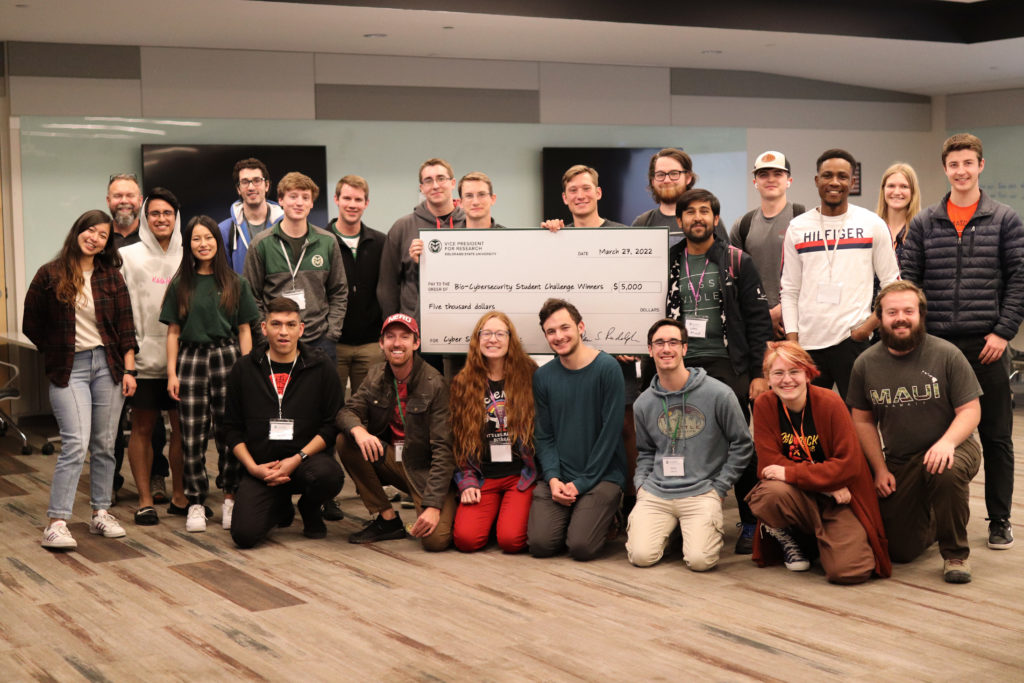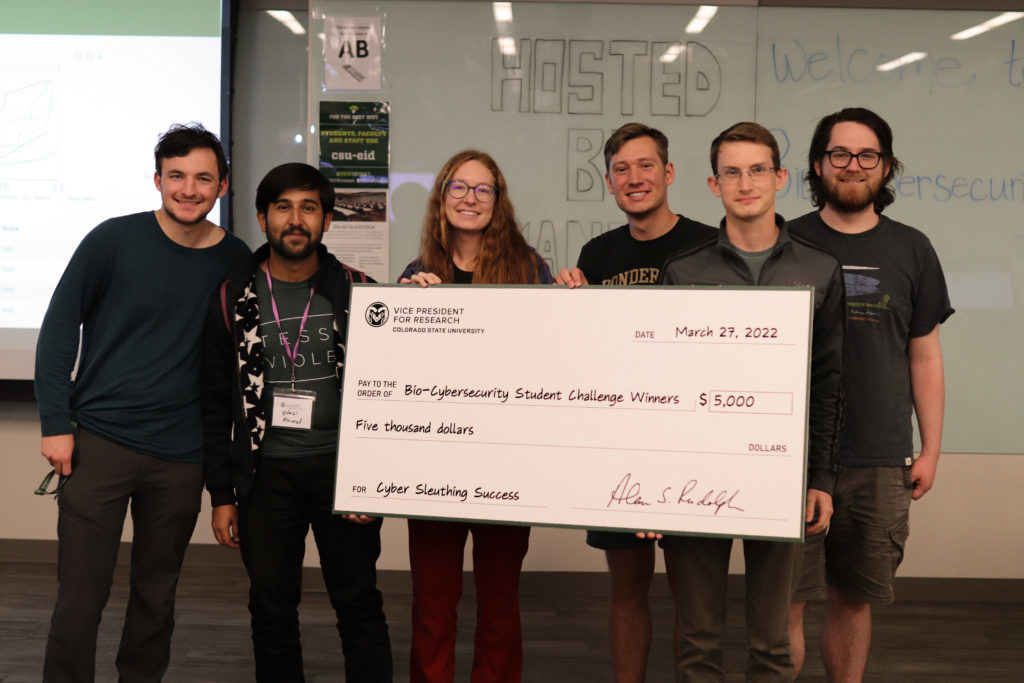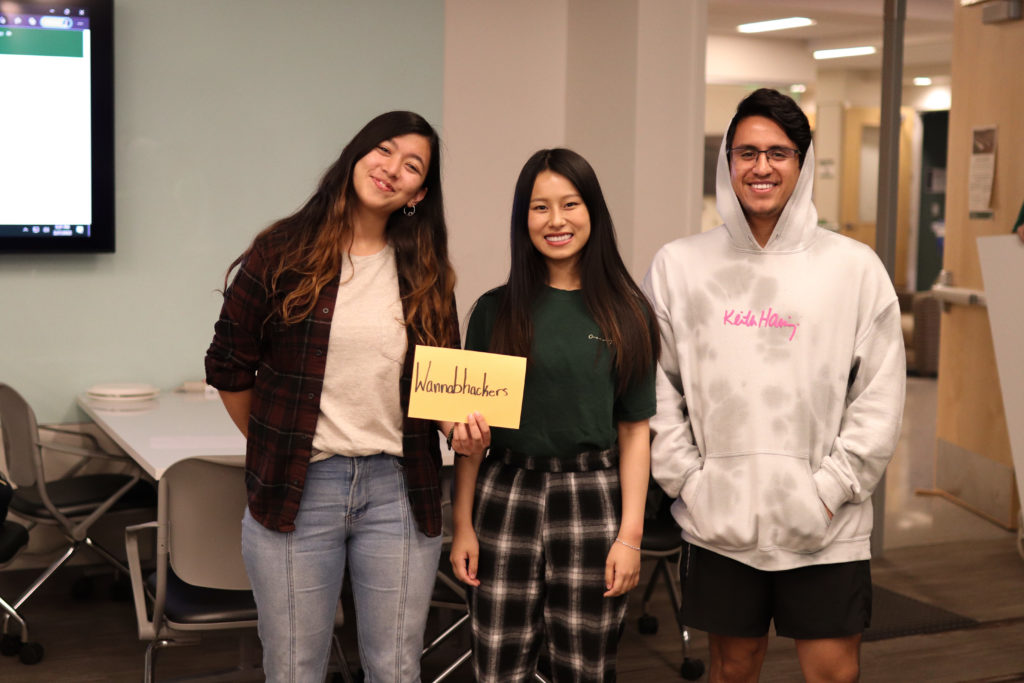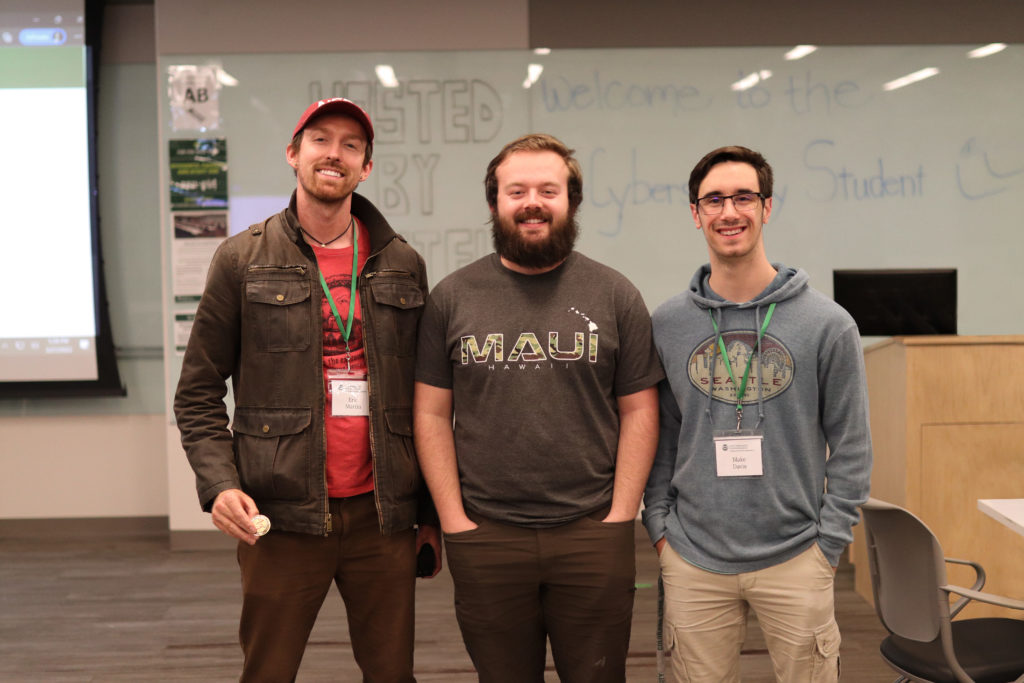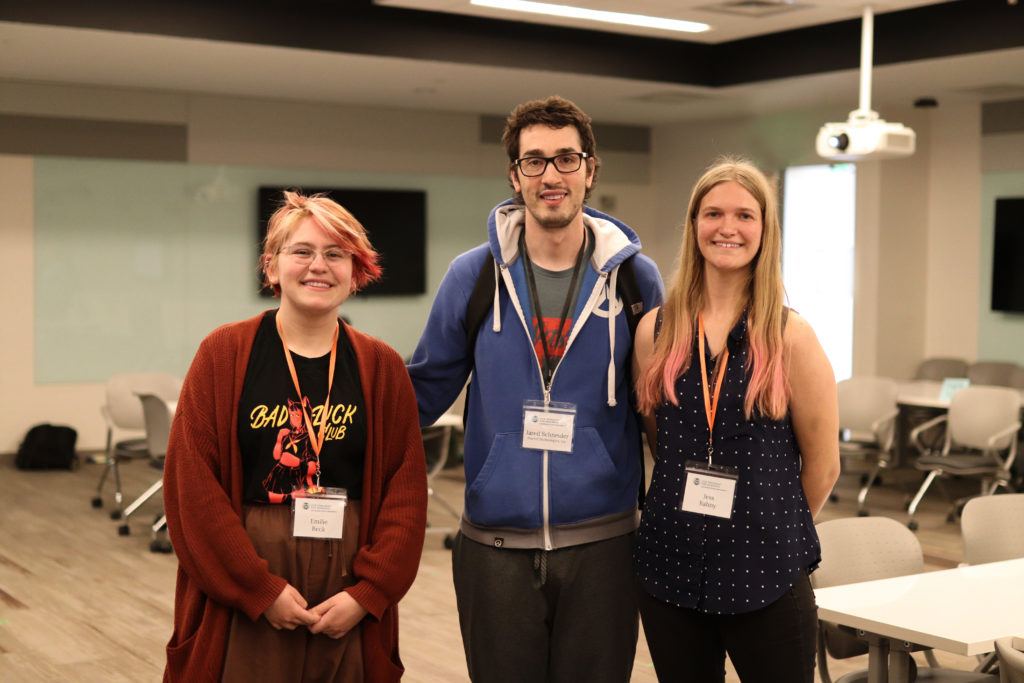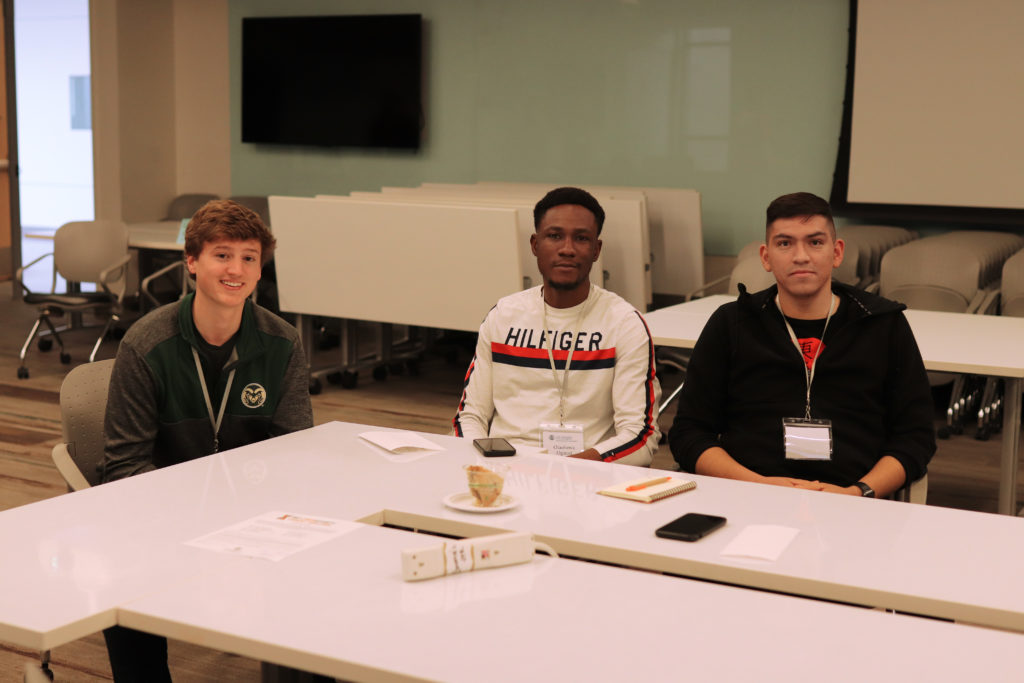Past Bio-Cybersecurity Events
Past Events:
In a world where everything important is on the internet, how to protect vital information and equipment from hackers? CSU offered students the opportunity to explore careers in this new world by sponsoring fun events to build skills in bio-cybersecurity. The 2022 Bio-Cybersecurity Student Challenge taught students ways to safeguard hospitals, secure vaccines, prevent damage to infrastructure, secure online meetings and protect private medical information. The 2-day computer-based contest was scheduled for March 26-27 when teams of students matched wits and computer skills in a series of group challenges much like capture-the-flag games of childhood.
Contests were tailored to all skill levels and open to all students and clubs, especially from biology, health sciences, computer science and engineering. Cash prizes worth $5,000 were awarded to cyber-sleuths who earned the most points. Winning teams also gained opportunities for networking and professional development with industry and university professionals. To learn more and connect with other participants, visit the Discord channel.
Watch on YouTube: Student Orientation Meeting Bio Cybersecurity Challenge
Watch on YouTube: Prepare To Play The Bio-Cybersecurity Student Challenge Event
March 2022 Bio-Cybersecurity Pay Schedule:
| Team | Points | Prize |
|---|---|---|
| Gravitationally Challenged | 565 | $1,296.38 |
| Ultra | 560 | $1,039.33 |
| Exploiting Enzymes | 500 | $854.76 |
| Rat King | 450 | $634.29 |
| Wannabehackers | 270 | $380.57 |
| Diabolical Box | 165 | $232.57 |
| 6 Armed Freshmen | 115 | $162.10 |
| $400 remainder paid to 8 individuals of HeLA, Team C, Ultra & 6 Armed Freshmen |
Speakers
Nina Alli, executive director, Biohacking Village. Nina has worked in New York City hospital and outpatient settings managing the complexities of modernizing legacy systems within the healthcare industry, beginning when electronic medical records, their associated IoT devices, and connectivity of Applications were conceptually new and laws were being adapted to meet new technologies. From this idea, Nina has taken the lessons and experiences to grow Biohacking Village over seven years from nine talks to five laboratories designed to engage and educate people on aspects that impact care practices to focus on biotechnology, citizen science and cybersecurity of the healthcare industry and the biomedical ecosystem. Nina has also worked on a microfluidic device to reduce the time for lab results to thirty minutes
Jasmine Jackson, Biohacking Village. Jasmine shares her passion with Information Security with presenting and teaching workshops with over ten years of Information Security experience. She is currently the jeopardy style Capture the Flag (CTF) coach for the inaugural US Cyber Games competing in the International Cyber Security Challenge (ICC) in Greece. She is also a contributing author, “97 Things Every Information Security Professional Should Know” O’Reilly Media and an Adjunct Professor at Drexel University teaching Mobile Security and City University of Seattle with additional courses with Cybrary and Infosec Institute in Vagrant and Intro to Linux. Finally, Jasmine has certifications in Secure Programming, Web Application Pentesting, and Cloud Security. Jasmine has a master’s degree in Computer Science and a Graduate Certificate in Information Security and Privacy from the University of North Carolina, Charlotte. Currently, she works for a Fortune 500 company as a Senior Application Security Engineer. She has presented her work domestically and internationally for such conferences – The Diana Initiative, Bugcrowd, Blacks in Cybersecurity, and NotPinkCon in topics of Mobile Security, and Web Application Security.
Whitney Zatzkin, CEO, Rare Dots, Inc. Whitney Bowman-Zatzkin, MPA, MSR, is a passionate community architect obsessed with connecting the dots to provoke change for the greater good. She is the CEO of Rare Dots, Inc. through which she dedicates energy to the Biohacking Village and founding of BIO-ISAC, as well as data privacy, genetic testing, maternal health, and aerospace clients. Whitney started in healthcare 20 years ago as the manager of a clinical practice, launching its EHR, redesigning the patient record, and engaging in advocacy efforts around maternal-infant health and malpractice reform. Moving to DC, she collaborated with policy leaders on research and policy changes around health professions education and workforce design. In the past, she has served as the Managing Director of Flip the Clinic, a project of the Robert Wood Johnson Foundation and Co-PI for Scouting Health, an investigative horizon-hunting effort with Westat. She also led the Great Challenges at TEDMED, producing 50+ broadcasts on the toughest conversations in health care.
Sarka Pekarova, Biohacking Village. Sarka has 10 years of experience in information security; working in various roles from defensive to her current role on offensive side of the cyber security spectrum. She specializes in healthcare/medical cyber security, industrial control systems, social engineering & physical security through research and education.
During the past year, there have been reports of increasing cyber threats to research databases and manufacturing operations. These follow an increasing frequency of ransomware threats to hospital systems and known vulnerabilities to operating systems for research and industrial equipment used in critical life sciences discovery and manufacturing. These threats apply across all areas of the bio-economy, including production of therapeutics, vaccines, chemicals, energy, and agriculture.
The purpose of this symposium is to bring together experts from multiple sectors to discuss the current vulnerabilities and opportunities for collaborative solutions in the emerging field of cyberbiosecurity.
Agenda & Speakers
All times are in Mountain Standard Time (MST)
12:30 p.m. Bio-cybersecurity Student Challenge Orientation.
A virtual orientation for CSU students who are interested in participating in the spring 2022 Bio-Cybersecurity Student Challenge.
1:00 p.m. Welcome & Opening Remarks
1:15 p.m. Session 1: How do Bio-cybersecurity risks affect the economy?
The panel will review bio-cybersecurity issues facing various industries and the risks they pose to industry and the public followed by audience questions.
- Kelvin Lee, director, National Institute for Innovation in Manufacturing Biopharmaceuticals & Gore Professor of Chemical & Biological Engineering, University of Delaware. Watch the recording.
- Ed You, supervisory special agent with the FBI in the Weapons of Mass Destruction Directorate
- Doug McKalip, senior advisor to the Secretary, United States Department of Agriculture. Watch the recording.
Moderator: Alan Rudolph, vice president for research, Colorado State University
2:30 p.m. Session 2: What are Bio-cybersecurity threats?
Experts will provide insights into bio-cybersecurity issues such as DNA synthesis and bio-manufacturing followed by audience questions. Watch the discussion recording.
- Charles Fracchia, CEO of BioBright & VP of Data at Dotmatics. Watch the recording.
- Jean Peccoud, professor, Department of Chemical and Biological Engineering and the Abell Endowed Chair in Synthetic Energy , Colorado State University. Watch the recording.
- Wayne Austad, CTO, National & Homeland Security at Idaho National Laboratory, chief R & D officer, CyManll Manufacturing Innovation Institute. Watch the recording.
Moderator: Rebecca Moritz, biosafety director, Office of the Vice President for Research, Colorado State University
3:45 p.m. Session 3: What is the path forward?
Representatives from a range of organizations will provide their views on current efforts to reduce bio-cybersecurity risks – and what we can do better — a moderator-led discussion followed by audience questions. Watch the discussion recording.
- Nina Alli, executive director, Biohacking Village
- Indrajit Ray, Professor, Department of Computer Science, Colorado State University
- Sterling Sawaya, Founder & CEO, GeneInfoSec
- Owen Redwood, Principal Security Researcher at Research Innovations, Inc.
Moderator: Dr. Kenneth Reardon, professor of Chemical & Biological Engineering and associate dean for research for the Walter Scott, Jr. College of Engineering, Colorado State University.
To inform the CSU community and the public about bio-cybersecurity issues and opportunities for research and education, the Office of the Vice President for Research at Colorado State University hosted a series of three discussions with short presentations by experts, followed by questions from the audience. The push to develop vaccines and drugs to counteract the SARS-CoV-2 virus has revealed cybersecurity issues such as attacks on vaccine databases. This is part of a larger, emerging issue facing bio-manufacturing in general, and is of growing concern for government, industry, and academia. Addressing these challenges will require multidisciplinary research collaboration and new educational efforts. Each event focused on a key element of Bio-Cybersecurity including DNA databases and commercial DNA synthesis, Bio-manufacturing, and Databases of bioprocess and product information.
Discussion 1: March 23, 2021
The DNA databases and commercial DNA synthesis discussion
What are the risks of attacks on DNA databases?” Are our current strategies enough to block the procurement of DNA for malicious purposes?
Discussion 2: April 6, 2021
Bio-Manufacturing Discussion
As manufacturing operations are increasingly networked, what are the risks that a controller or sample analysis instrument could be attacked and manipulated by outside entities?
Discussion 3: April 20, 2021
Databases of Bioprocess and Product Information Discussion
Companies and universities store valuable data on processes and products, including vaccines, under development and production. How can the information in these databases be protected from outside entities?
CSU OVPR in collaboration with our industry partner Mantel Technologies hosted a Cyberbiosecurity Hackathon 28-29 September 2019. We invited teams of software developers, programmers, biology majors and other interested students to participate in this collaborative hackathon event. Cash prizes were awarded for a number of achievements during the event.
- Winners:
- First Place: Team “Kryptsec” (Marshall Livingston, Derek Larkins, Drew Achtermann, David (Cole) Petty, Rex Steele)
- Second Place: Team “CorrectHorseBatteryStaple” (Ben Gillett, David Hallstrom)
- Winners:
